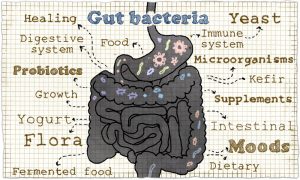Here’s a report of some exciting new research that has a multitude of storylines. It hits on:
- The importance of the microbiome to many aspects of our health – allergies and obesity in particular.
- Having a dog (or more precisely “a furry pet”) can influence the microbiome of babies – even before they’re born.
- It’s another blow against the clean-freaks of the world
- Your microbiome is about to get commercialized.

Researchers at the University of Alberta studied the microbiome (the make up, and genetic material, of all the bacteria and micro-organisms that live in our gut) of newborn babies and infants*. They found having a dog increased the prevalence of certain bacteria (Ruminococcus and Oscillospira) which decreased the risk of the kid having allergies or getting obese.
Even if the dog was removed from the household before the baby was born there was still a beneficial effect. So apparently the mother can pass on these beneficial bacteria – or something from them, that is beneficial.
Dogs and Clean Freaks
I know everyone worries that your dog licks it’s but and then comes and licks your face. But maybe this is good for you? It is a blow to all those clean-freaks who I am always deriding - the ones that actually use those wipes provided at the entrance to stores, to sanitize the handle of their shopping cart for example**. Or who buy the antibiotic impregnated toilet seats.
Interest in the Microbiome
There is more and more interest in what our microbiomes do for our health. The same Canadian team have done work on newborns and infants showing conditions that are likely to imperil the formation of a normal, healthy microbiome by not exposing the kid to normal flora. A circumstance that happens when the mother receives antibiotics at delivery; if the baby is not breast fed; or if the baby is born by C-section – though I am slightly amused that juniors first, and necessary, inoculation, is by traversing the vagina - a location one doesn’t always think of as being the most savory). These circumstances are associated with a higher risk of asthma and allergies.

Higher levels of the two bacteria found are also correlated with a lower risk of obesity. And prenatal pet exposure reduces the risk of group B strep infection (a bacteria that is found in the vagina or rectum of 25% of pregnant women and is associated with pneumonia or meningitis in the baby).
Industry Not Laying Doggo
Don’t expect the industry to be laying doggo (sorry – an Englisim I couldn’t resist – meaning to just do nothing. Play dead). Major drug companies are taking great interest in manipulation of the microbiome – or of the genetic material of the 100 trillion micro-organisms that live in, or on us.
There is a report of Johnson and Johnson with partners, paying $241 million for a mix of Clostridia sub-species to try to use it for treating Chrone’s disease (https://pharmaphorum.com/articles/realising-the-potential-of-the-microbiome). And Anita Kozyrskyj of the pediatrics department of the University of Alberta speculates this avaricious and creative industry may formulate a “dog pill.”
And the take home message? I would urge you not to be too much of a clean freak. Babies put everything in their mouths and somehow survive it. And a bit of "dirt" is good for you it seems.
*Canadian Healthy Infant Longitudinal Development study published in journal Microbiome (https://microbiomejournal.biomedcentral.com/articles/10.1186/s40168-017-0254-x)
** I know I will get push-back on this. And in the hospital setting washing/sanitizing hands is important – I just haven’t seen the study that shows any benefit in everyday life.




